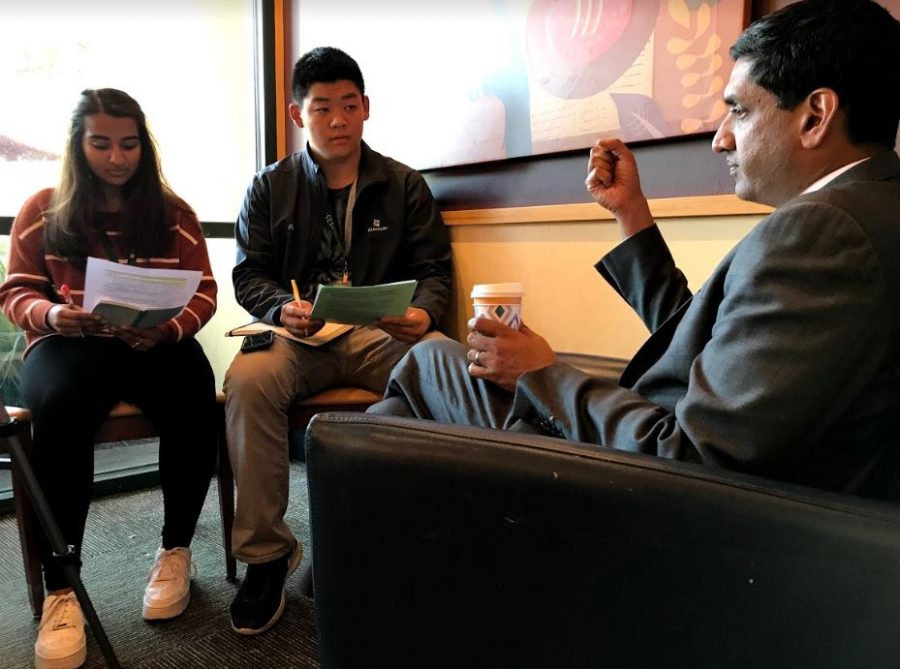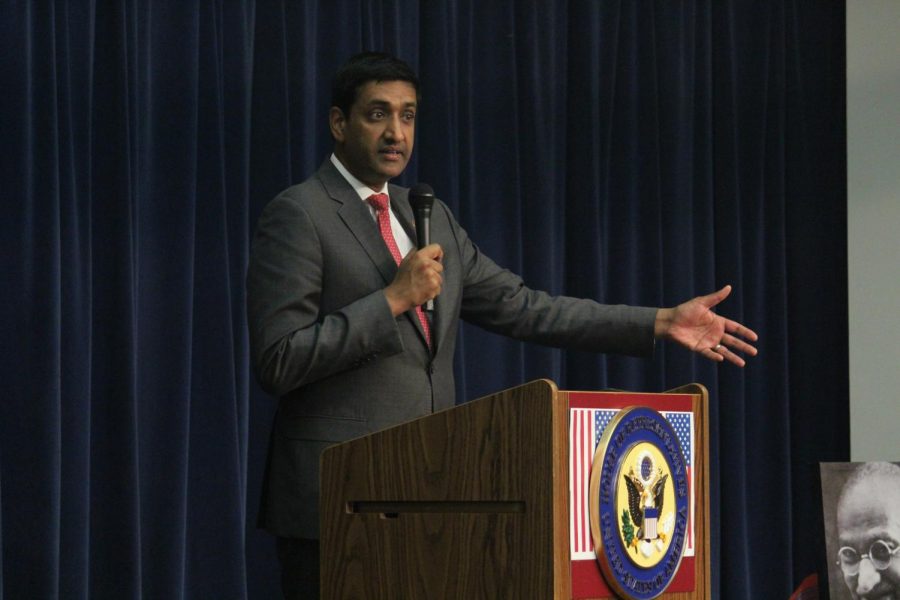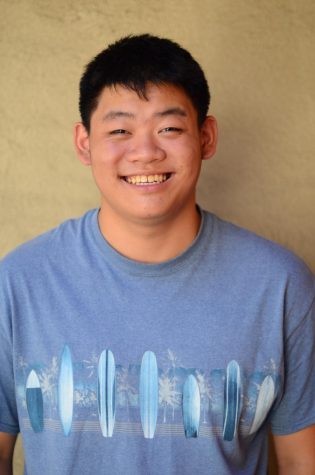In conversation with US Rep. Ro Khanna: Khanna weighs in on impeachment, political activism and the housing crisis
Eric Fang (12) and Arushi Saxena (11) interview Congressman Ro Khanna. Khanna represents California’s 17th district, including parts of South and East San Francisco Bay Area.
October 18, 2019
Settling into a large suede armchair, U.S. Rep. Ro Khanna took a slow sip of his coffee. Over the next half hour, Khanna discussed his work as a representative since 2016 and key issues faced by his constituents, including housing, student debt and climate change.
Khanna represents California’s 17th Congressional District, which encompasses cities in Santa Clara and Alameda Counties. In addition to serving on the Armed Services and Budget Committees in Congress, Khanna is a member of the House Committee on Oversight and Reform, which is gathering evidence in an impeachment inquiry against President Donald Trump.
Winged Post: How did you get involved in politics and know you wanted to be a Congressman?
Ro Khanna: My grandfather spent four years in jail with Gandhi, and he had a big influence on my thinking. My parents were immigrants, I went to public school, I had teachers who encouraged me to get active in public affairs and that’s what made me interested. Then I worked in Barack Obama’s very first campaign when he was running for the State Senate and got a sense of what it was like to work for someone in elected office.
WP: Can you talk about being an Indian American in politics and any challenges that you’ve faced?
RK: I take great pride in my roots, in my heritage, it’s helped shape who I am, shaped my passion for education, for human rights, for pluralism and inclusivity, and it’s something that I care about very deeply. In terms of challenges, I think that you have to overcome initially some misunderstanding of how you pronounce your name or a different set of understanding when people may not understand everything about the culture, but I’ve found in this community, people are very welcoming.
WP: How politically aware were you in high school? How do you compare your experiences then with the experiences of current high schoolers?
RK: I was quite active in high school. I was involved in debate, I would write letters to the editor to my local papers, and really followed the issues. I find a similar activism of young people today, on climate change, on issues of gun violence, on issues of human rights. I’m very inspired by young people.
WP: How do you as a Congressman build youth activism?
RK: I think what we need to do is listen to young people. I take a lot of readings with young folks where they write to the office, I go to high schools to speak to students, I make sure that we do forums where students’ voices are appreciated. I think we encourage young people to get involved after we show them we respect and care about their perspective and listen to them.
WP: From your town halls and interactions with constituents, what have you seen to be most pressing issues facing this district as a whole?
RK: Cost of living. The cost of college becoming exorbitant. The cost of housing being so exorbitant, how are young people even going to live here? The traffic, the transportation issues. But I would say affordable college, affordable housing, affordable transportation or more access to transportation.
WP: And what issues facing young adults like us do you think are most pressing in this district?
RK: Getting a good-paying job, and understanding what those jobs in the future are going to be. Making sure that you don’t go into debt in college, so that you can get a good education, and making sure that we have a planet that is inhabitable and doesn’t have catastrophic consequences.
WP: As you mentioned, there’s a lot of concern about an ongoing housing crisis in this district, and we even have a homeless encampment right outside our school. How are you planning to address the housing crisis?
RK: We do three things. We can increase sectioning rent vouchers so that people can get more vouchers to rent apartments that are high-priced, we can get a building tax credit for building affordable housing and then we build some shelters so that people can temporarily be in housing before they go into permanent housing.
WP: How can we address the major rise in student debt in our nation?
RK: I agree with Senator Sanders and Senator Warren that we ought to be forgiving of student loan debt for people who are making under $100,000, and for families of working and middle class, we ought to make college free.
WP: We have a study about vaping conducted by Santa Clara County that says that about 1 in 3 teens in the county has tried vaping. How is your office planning to address this?
RK: Wow is it that high? I’m part of the vaping caucus, and I have said that we ought to ban flavors when it comes to vaping and ban marketing to young people, and advertising we have to regulate it similarly as we regulate cigarettes.
WP: You’ve previously written that California can and should do a lot more to combat the climate crisis, including by enacting a no-tolerance policy for new fossil fuel projects. What do you think the Silicon Valley in particular can do to address climate change?
RK: We can come up with extraordinary new solutions. For example, I was meeting with an entrepreneur of a company that planned to build a trillion trees in one year. There are solutions when it comes to geothermal, there are solutions on battery storage to figure out how to store the energy that we’re producing, so the Silicon Valley can lead the way in coming up with these new technologies.
WP: You’ve also been outspoken about supporting the Green New Deal. What does the deal entail for you exactly?
RK: It entails a huge opportunity for new jobs in solar and wind and energy efficiency and biofuels and making sure that we are creating those jobs across the country.
WP: Do you have a plan for getting it through Congress?
RK: We hope to, but right now it’s got a lot of work to do because there’s not that many people on it, but as the young people get more active and we get more activism, I hope we will.
WP: What have you heard from your constituents about the ruling in support of Harvard’s race-conscious admissions practices?
RK: I have not heard much about it from constituents, and I think what we need to do is of course recognize that diversity and inclusion is a strength and make sure that everyone has an opportunity to go to a good school but also to make sure that there’s inclusiveness and everyone has an opportunity.
WP: With recent mass shootings, school safety has been a big concern for our classmates and teachers. How are you working to ensure the safety of schools against shootings?
RK: It’s a huge issue, and that I hear a lot about from constituents. We have to have an assault weapons ban, we have to ban high-capacity magazines, we should have a universal background check. These are common sense laws that protect people and take dangerous weapons off our streets.
WP: In an immigrant-rich area such as the Silicon Valley, what is your response to Trump’s stance and repeated attacks on both immigration policy and immigration in general?
RK: Immigrants make the economy stronger and contribute a lot to this country, so we have to go back to those first parts of us.
WP: Building off that, what is your response to the way that Trump has been promoting his wall?
RK: I oppose that. I think that he has been very divisive, and I don’t think he understands the contribution that immigrants make to our economy and country.
WP: You’ve been a vocal advocate in Congress of impeaching President Donald Trump. Why do you think an impeachment inquiry will benefit the American people and your district?
RK: We have to stand up for the Constitution. We can’t allow that kind of foreign influence in our elections.
WP: You’re a member of the House Committee on Oversight and Reform. What role does this committee have in an impeachment inquiry?
RK: We are helping to gather the evidence, and then ultimately we go to the Judiciary Committee. The Oversight Committee helps figure out what the evidence is, and then refers that to the Judiciary Committee.
WP: Being on this committee, do you have a roadmap laid out for the future for this impeachment process?
RK: We do. There’s six committees, and they’re all different aspects of the problem and they’re all conducting investigations, and then we will combine all of that to the Judiciary Committee that’ll make the determination.
WP: What do you think it means for our country to impeach President Trump at this time?
RK: It would be a signal of how we’re standing up against the abuse of power, the abuse of his office.
WP: Do you think it’s feasible to achieve this before his term is up?
RK: Yes, I think by the end of the year is realistic.
WP: Some people believe that this impeachment inquiry will actually help Trump gain re-election by showing his voter platform that the Democrats are ostensibly attacking him. What would you say to those people who believe that this might help his campaign?
RK: I don’t think you have to look at the politics of this, I think you have to look at your constitutional bidding and make a determination whether he’s abused his office or not.
WP: You’ve endorsed Bernie Sanders for president out of the entire slate of candidates. Why and how do you believe Sanders best aligns with the needs of this district’s constituents?
RK: I think many people here want to have free public college. They don’t like the high cost of education. Many here believe in Medicare for All. They understand that everyone should have healthcare. And many don’t want to get into foreign wars, and Bernie Sanders has talked about making sure that we don’t get into unconstitutional wars.
WP: What do you think makes this district unique?
RK: I think what makes it special is the incredible diversity of people from backgrounds all over the world who have chosen to come here to contribute. And the innovation, we lead the world in innovation, with Apple, Intel, Google, Yahoo, LinkedIn, Tesla, Cisco. I also think the values of this area are very much about respect, tolerance and the search for mutual understanding, so I’m very proud to represent the area.


















![“[Building nerf blasters] became this outlet of creativity for me that hasn't been matched by anything else. The process [of] making a build complete to your desire is such a painstakingly difficult process, but I've had to learn from [the skills needed from] soldering to proper painting. There's so many different options for everything, if you think about it, it exists. The best part is [that] if it doesn't exist, you can build it yourself," Ishaan Parate said.](https://harkeraquila.com/wp-content/uploads/2022/08/DSC_8149-900x604.jpg)




![“When I came into high school, I was ready to be a follower. But DECA was a game changer for me. It helped me overcome my fear of public speaking, and it's played such a major role in who I've become today. To be able to successfully lead a chapter of 150 students, an officer team and be one of the upperclassmen I once really admired is something I'm [really] proud of,” Anvitha Tummala ('21) said.](https://harkeraquila.com/wp-content/uploads/2021/07/Screen-Shot-2021-07-25-at-9.50.05-AM-900x594.png)







![“I think getting up in the morning and having a sense of purpose [is exciting]. I think without a certain amount of drive, life is kind of obsolete and mundane, and I think having that every single day is what makes each day unique and kind of makes life exciting,” Neymika Jain (12) said.](https://harkeraquila.com/wp-content/uploads/2017/06/Screen-Shot-2017-06-03-at-4.54.16-PM.png)








![“My slogan is ‘slow feet, don’t eat, and I’m hungry.’ You need to run fast to get where you are–you aren't going to get those championships if you aren't fast,” Angel Cervantes (12) said. “I want to do well in school on my tests and in track and win championships for my team. I live by that, [and] I can do that anywhere: in the classroom or on the field.”](https://harkeraquila.com/wp-content/uploads/2018/06/DSC5146-900x601.jpg)
![“[Volleyball has] taught me how to fall correctly, and another thing it taught is that you don’t have to be the best at something to be good at it. If you just hit the ball in a smart way, then it still scores points and you’re good at it. You could be a background player and still make a much bigger impact on the team than you would think,” Anya Gert (’20) said.](https://harkeraquila.com/wp-content/uploads/2020/06/AnnaGert_JinTuan_HoHPhotoEdited-600x900.jpeg)

![“I'm not nearly there yet, but [my confidence has] definitely been getting better since I was pretty shy and timid coming into Harker my freshman year. I know that there's a lot of people that are really confident in what they do, and I really admire them. Everyone's so driven and that has really pushed me to kind of try to find my own place in high school and be more confident,” Alyssa Huang (’20) said.](https://harkeraquila.com/wp-content/uploads/2020/06/AlyssaHuang_EmilyChen_HoHPhoto-900x749.jpeg)









